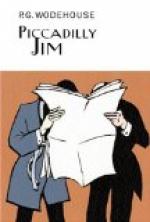As he did so a curious thing happened to him. He began to have that feeling, which every one has experienced at some time or other, that he had done this very thing before. He was almost convinced that this was not the first time he had seen that poem on page twenty-seven entitled “A Lament.” Why, some of the lines seemed extraordinarily familiar. The people who understood these things explained this phenomenon, he believed, by some stuff about the cells of the brain working simultaneously or something. Something about cells, anyway. He supposed that that must be it.
But that was not it. The feeling that he had read all this before grew instead of vanishing, as is generally the way on these occasions. He had read this stuff before. He was certain of it. But when? And where? And above all why? Surely he had not done it from choice.
It was the total impossibility of his having done it from choice that led his memory in the right direction. There had only been a year or so in his life when he had been obliged to read things which he would not have read of his own free will, and that had been when he worked on the Chronicle. Could it have been that they had given him this book of poems to review? Or—?
And then memory, in its usual eccentric way, having taken all this time to make the first part of the journey, finished the rest of it with one lightning swoop, and he knew.
And with the illumination came dismay. Worse than dismay. Horror.
“Gosh!” said Jimmy.
He knew now why he had thought on the occasion of their first meeting in London that he had seen hair like Ann’s before. The mists rolled away and he saw everything clear and stark. He knew what had happened at that meeting five years before, to which she had so mysteriously alluded. He knew what she had meant that evening on the boat, when she had charged one Jimmy Crocker with having cured her of sentiment. A cold sweat sprang into being about his temples. He could remember that interview now, as clearly as if it had happened five minutes ago instead of five years. He could recall the article for the Sunday Chronicle which he had written from the interview, and the ghoulish gusto with which he had written it. He had had a boy’s undisciplined sense of humour in those days, the sense of humour which riots like a young colt, careless of what it bruises and crushes. He shuddered at the recollection of the things he had hammered out so gleefully on his typewriter down at the Chronicle office. He found himself recoiling in disgust from the man he had been, the man who could have done a wanton thing like that without compunction or ruth. He had read extracts from the article to an appreciative colleague. . . .
A great sympathy for Ann welled up in him. No wonder she hated the memory of Jimmy Crocker.




